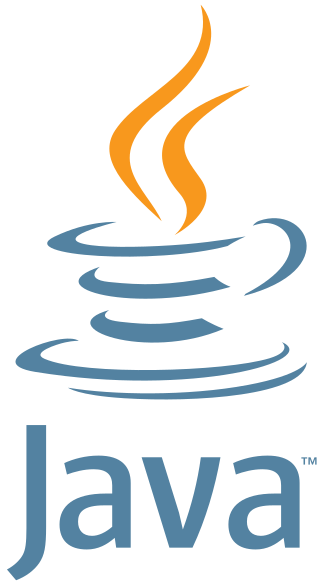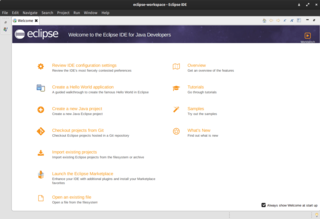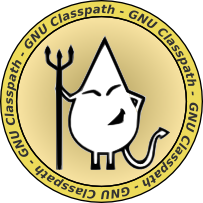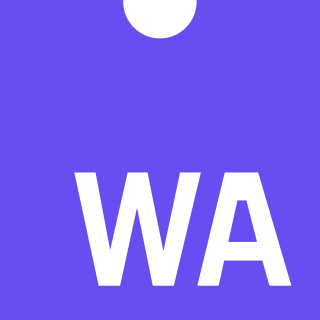
Java is a high-level, class-based, object-oriented programming language that is designed to have as few implementation dependencies as possible. It is a general-purpose programming language intended to let programmers write once, run anywhere (WORA), meaning that compiled Java code can run on all platforms that support Java without the need to recompile. Java applications are typically compiled to bytecode that can run on any Java virtual machine (JVM) regardless of the underlying computer architecture. The syntax of Java is similar to C and C++, but has fewer low-level facilities than either of them. The Java runtime provides dynamic capabilities that are typically not available in traditional compiled languages.

A Java virtual machine (JVM) is a virtual machine that enables a computer to run Java programs as well as programs written in other languages that are also compiled to Java bytecode. The JVM is detailed by a specification that formally describes what is required in a JVM implementation. Having a specification ensures interoperability of Java programs across different implementations so that program authors using the Java Development Kit (JDK) need not worry about idiosyncrasies of the underlying hardware platform.
In computing, cross-platform software is computer software that is designed to work in several computing platforms. Some cross-platform software requires a separate build for each platform, but some can be directly run on any platform without special preparation, being written in an interpreted language or compiled to portable bytecode for which the interpreters or run-time packages are common or standard components of all supported platforms.
Bytecode is a form of instruction set designed for efficient execution by a software interpreter. Unlike human-readable source code, bytecodes are compact numeric codes, constants, and references that encode the result of compiler parsing and performing semantic analysis of things like type, scope, and nesting depths of program objects.

Eclipse is an integrated development environment (IDE) used in computer programming. It contains a base workspace and an extensible plug-in system for customizing the environment. It had been the most popular IDE for Java development until 2016, when was surpassed by IntelliJ IDEA. Eclipse is written mostly in Java and its primary use is for developing Java applications, but it may also be used to develop applications in other programming languages via plug-ins, including Ada, ABAP, C, C++, C#, Clojure, COBOL, D, Erlang, Fortran, Groovy, Haskell, HLASM, JavaScript, Julia, Lasso, Lua, NATURAL, Perl, PHP, PL/I, Prolog, Python, R, Rexx, Ruby, Rust, Scala, and Scheme. It can also be used to develop documents with LaTeX and packages for the software Mathematica. Development environments include the Eclipse Java development tools (JDT) for Java and Scala, Eclipse CDT for C/C++, and Eclipse PDT for PHP, among others.

GNU Classpath is a free software implementation of the standard class library for the Java programming language. Most classes from J2SE 1.4 and 5.0 are implemented. Classpath can thus be used to run Java-based applications. GNU Classpath is a part of the GNU Project. It was originally developed in parallel with libgcj due to license incompatibilities, but later the two projects merged.
Visual J++ is Microsoft's discontinued implementation of Java. Syntax, keywords, and grammatical conventions were the same as Java's. It was introduced in 1996 and discontinued in January 2004, replaced to a certain extent by J# and C#.

Java is a set of computer software and specifications that provides a software platform for developing application software and deploying it in a cross-platform computing environment. Java is used in a wide variety of computing platforms from embedded devices and mobile phones to enterprise servers and supercomputers. Java applets, which are less common than standalone Java applications, were commonly run in secure, sandboxed environments to provide many features of native applications through being embedded in HTML pages.
The Dynamic Language Runtime (DLR) from Microsoft runs on top of the Common Language Runtime (CLR) and provides computer language services for dynamic languages. These services include:
The Java Development Kit (JDK) is a distribution of Java technology by Oracle Corporation. It implements the Java Language Specification (JLS) and the Java Virtual Machine Specification (JVMS) and provides the Standard Edition (SE) of the Java Application Programming Interface (API). It is derivative of the community driven OpenJDK which Oracle stewards. It provides software for working with Java applications. Examples of included software are the Java virtual machine, a compiler, performance monitoring tools, a debugger, and other utilities that Oracle considers useful for Java programmers.
RemObjects Software is an American software company founded in 2002 by Alessandro Federici and Marc Hoffman. It develops and offers tools and libraries for software developers on a variety of development platforms, including Embarcadero Delphi, Microsoft .NET, Mono, and Apple's Xcode.

Mono is a free and open-source software framework that aims to run software made for the .NET Framework on Linux and other OSes. Originally by Ximian which was acquired by Novell, it was later developed by Xamarin which was acquired by Microsoft. In August 2024, Microsoft transferred ownership of Mono to WineHQ.
Java bytecode is the instruction set of the Java virtual machine (JVM), the language to which Java and other JVM-compatible source code is compiled. Each instruction is represented by a single byte, hence the name bytecode, making it a compact form of data.
Java code coverage tools are of two types: first, tools that add statements to the Java source code and require its recompilation. Second, tools that instrument the bytecode, either before or during execution. The goal is to find out which parts of the code are tested by registering the lines of code executed when running a test.
GraalVM is a Java Development Kit (JDK) written in Java. The open-source distribution of GraalVM is based on OpenJDK, and the enterprise distribution is based on Oracle JDK. As well as just-in-time (JIT) compilation, GraalVM can compile a Java application ahead of time. This allows for faster initialization, greater runtime performance, and decreased resource consumption, but the resulting executable can only run on the platform it was compiled for.

WebAssembly (Wasm) defines a portable binary-code format and a corresponding text format for executable programs as well as software interfaces for facilitating communication between such programs and their host environment.
Microsoft, a tech company historically known for its opposition to the open source software paradigm, turned to embrace the approach in the 2010s. From the 1970s through 2000s under CEOs Bill Gates and Steve Ballmer, Microsoft viewed the community creation and sharing of communal code, later to be known as free and open source software, as a threat to its business, and both executives spoke negatively against it. In the 2010s, as the industry turned towards cloud, embedded, and mobile computing—technologies powered by open source advances—CEO Satya Nadella led Microsoft towards open source adoption although Microsoft's traditional Windows business continued to grow throughout this period generating revenues of 26.8 billion in the third quarter of 2018, while Microsoft's Azure cloud revenues nearly doubled.






